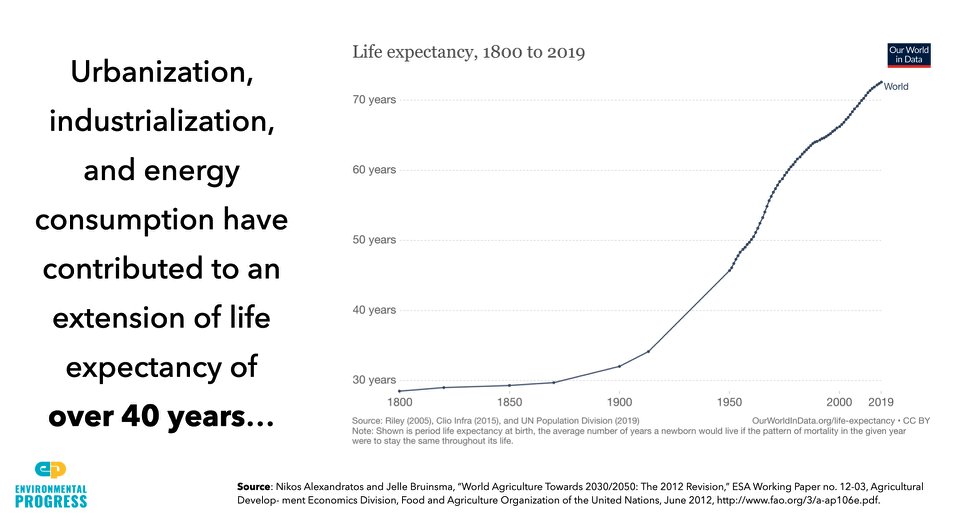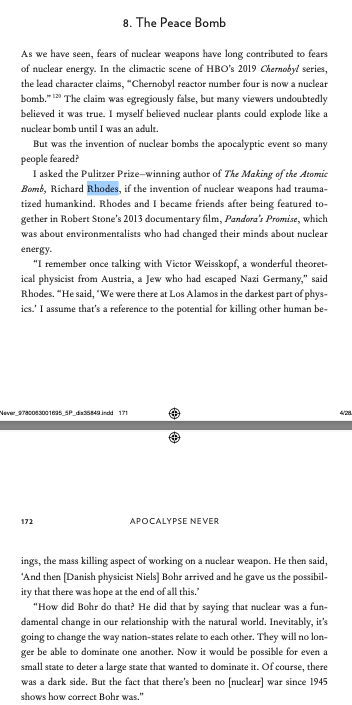
Greta Thunberg is one of the most powerful individuals in Europe & yet the EU has decisively rejected her demand that it not finance more nuclear & natural gas plants. Why is that? Why did nations whose publics adore Greta reject her main demands? michaelshellenberger.substack.com/p/why-gretas-c…
The most influential climate activist in the world, with no runner-up in sight, is Greta Thunberg. Time Magazine named her Person of the Year for 2019 and it feels inevitable that she will win the Nobel Peace Prize eventually if not this year.
With her 14 million followers on Instagram and her five million followers on Twitter, everything she does is news. Reuters named as one its key “Moments from 2021” Thunberg singing and dancing at a promotional “Climate Live” concert in advance of the United Nations climate talks.
But for all of her fame, Thunberg’s political influence has never been lower. Two weeks ago, Thunberg and other climate leaders demanded that Europe not finance either nuclear plants or natural gas production, but the European Commission rejected her demands.
The EC confirmed Saturday that both nuclear and natural gas will be counted as sustainable and thus be available for for European Union financing. The EU “sustainable taxonomy” deal appears to be a compromise between nuclear-reliant France and increasingly gas-reliant Germany.
Thunberg remains powerful. Many analysts until recently thought shareholder activism aimed at forcing divestment from oil and gas production was strictly symbolic, merely a way to draw attention to the need for public policy.
It’s now clear that such activism was remarkably effective in suppressing private sector financing for oil and gas exploration and production, contributing to shortages. That was, in no small measure, due to her connection to the children of financial and journalistic elites
But the EU’s decision to ratify gas and nuclear as green is a major blow to Thunberg and the climate-renewables lobby. It comes on the heels of: the collapse of Biden’s climate agenda in part because it would make the US dangerously dependent on renewables;...
... the hypocrisy of European climate diplomats at United Nations climate talks, demanding Africa remain pure of coal and gas as European energy ministers scrambled to burn coal and acquire natural gas; and, now, Germany’s replacement of half of its nuclear with coal & gas.
What’s going on? It appeared Europe was “transitioning to renewables.” Why is it now embracing gas & nuclear? And why were Thunberg and the climate movement defeated in Europe, the place where they were presumed to be the strongest? And what does it mean for what happens next?
Europe chose to affirm natural gas and nuclear as sustainable because, in part, the two energies are most responsible for declining carbon emissions. The EU reduced its emissions 26% below 1990 levels by 2020, mostly due to replacing coal with natural gas, & closing coal plants.
British emissions in 2019 were at their lowest since 1888, mostly thanks to the switch from coal to oil and natural gas. And yet Thunberg called natural gas production by Britain "one of the greatest failures of humankind.”
Emissions in France, Britain, and Germany all started declining in the mid-1970s, thanks in large part to the the expansion of nuclear. Today, nuclear-heavy France produces one-eighth the carbon emissions as anti-nuclear Germany.
And yet Thunberg calls nuclear power “extremely dangerous, expensive, and time-consuming” and lobbies against its expanded use.
But it wasn’t until the current energy crisis caused by shortages of oil and gas and nuclear that European policymakers and the public snapped out of their trance and came to appreciate viscerally why Europeans cannot rely upon weather-dependent renewables.
The alternative to natural gas and nuclear is coal, which Europe, led by Germany, burned more of in 2021, in part due to lack of wind, and will burn more of this year.
Natural gas futures in Europe in December were ten times higher than in the U.S. In Britain, 30 energy companies have gone bankrupt since September, due to skyrocketing natural gas prices, which are due to shortages of natural gas.
Liquified natural gas produced from American frackers and shipped to Europe helped reduce the crisis, but Europe’s “energy crunch could last years” notes a Bloomberg reporter, pointing to markets for energy futures.
Naturally, the weakest members of any society suffer the most. It was poor Kosovo, not rich Germany, that was forced into electricity blackouts just before Christmas. Why? Because the World Bank in 2018 denied it the funding it needed for a coal plant in the name of the climate.
“I don’t want you to be hopeful,” said Thunberg in 2019. “I want you to panic,” which meant she wanted people to engage in “unthinking behavior,” which they did.
Lest they misunderstood what she was saying, a few months later Thunberg tweeted, “If standing up against the climate and ecological breakdown and for humanity is against the rules, then the rules must be broken.”
Her followers obliged. Hundreds of thousands of people took to the streets, in the fall of 2019, to protest. In Britain, two Extinction Rebellion activists stopped a train in the London Tube by jumping on its roof; they were almost killed by an angry mob.
And governments and private investors shifted billions in investments from oil and gas to renewables. The result is the worst global energy crisis in 50 years.
Is it really very surprising that a panicked mob made such terrible decisions?
Is it really very surprising that a panicked mob made such terrible decisions?
The energy crisis wasn’t entirely caused by Thunberg and the climate movement. There were supply chain problems due to covid. And many oil and gas companies and OPEC nations wanted higher prices after a decade of abundant oil and gas resulting in historic low energy prices.
But the climate shareholder activist movement successfully reduced public and private investments in oil and gas according to independent analysts and journalists from Financial Times, Goldman Sachs, & Bloomberg, which cheerlead for, take money from, or invest in renewables.
When Thunberg in 2019 said, “This ongoing irresponsible behavior will no doubt be remembered in history as one of the greatest failures of humankind," she was referring specifically to natural gas production in Britain, both fracking on land and off-shore production.
Thunberg’s closest allies have long been German Green Party activist-scientists at places like the Malthsuian Potsdam Institute whose scientists promote pseudoscientific ideas about climate change and famines while advocating the closure of nuclear plants
forbes.com/sites/michaels…
forbes.com/sites/michaels…
The impact of Thunberg’s anti-nuclear renewables-only advocacy directly impacted France, which has throttled its nuclear plants in service of demands from climate alarmists within Macron’s coalition.
Macron allowed the greater use of natural gas and wind energy, a decision that recarbonized French electricity, and was also directly harmful to its nuclear plants, which have suffered significant outages when they were needed most, the current energy crisis.
A full one-third of the French nuclear fleet is not operating. “It has been national [French] policy since 2015 to reduce the output of the large French nuclear fleet,” said @energybants
“France experiences extremely long reactor outages, both planned and unplanned.”
“France experiences extremely long reactor outages, both planned and unplanned.”
This passage of events is a regrettable stain on the French nuclear industry, and Macron’s presidency, since ultimately the head of the French government is responsible for the French industry.
The United States outperforms French reactors in many ways.
The United States outperforms French reactors in many ways.
This is due in part because they are protected by state governments whereas in France they are more vulnerable to national politics and anti-nuclear efforts to undermine the operations of nuclear power plants. The same has been occurring in South Korea.
The US nuclear industry successfully raised its fleet-wide operation average from 55% at the time of the Three Mile Island accident in 1979 to 92% today by, in large measure, reducing unplanned reactor outages as well as becoming highly efficient in planned re-fueling outages.
Anti-nuclear forces within governments deny plants the proper maintenance they need and then mislead people into into believing there is something inherently wrong with nuclear. In truth, nuclear plants suffer problems engineers are skilled at predicting and thus avoiding.
In other words, the failure of nuclear plants almost always has its roots in politics. While that’s often bad news, it can also be good news.
In the past, Germany has been the dominant player in Europe on energy & climate issues, with Britain and France vying for the number two role. But with Britain’s exist from the EU, and the recent departure of Chancellor Angela Merkel, Macron is today the de facto leader of Europe
Macron could be the leader of Europe or he could fail to seize the moment. He nearly destroyed his presidency in 2018 when he raised gasoline prices, resulting in some of the most debilitating and politically damaging “yellow vest” mass consumer protests in history.
But Macron may have learned his lesson. In 2019 he warned that what Thunberg was proposing was “radical” and would “antagonize societies.” He added, “When I see that we are going to… stop the exploitation of hydrocarbons, I am not sure that this is the most efficient way.”
Recently Macron, under pressure from the pro-nuclear political Right, and responding to the energy shortages, has put atomic energy at the center of his “France 2030” vision. Whether or not voters in April re-elect Macron, or elect a conservative, nuclear will be the winner.
In France, nuclear can once again be a source of abundance during times of scarcity. It can once again be a source of grandeur. And it can represent triumph of science over superstition, and reason over panic.
The relationship between energy & the economy is the opposite of what Thunberg says. She claimed that “economic growth” is the cause of climate change. But global emissions declined over the last 10 years as GDP grew from $65 trillion to $82 trillion (in constant 2015 US dollars)
Europe is not an outlier: the US reduced its emissions 22% below 2005 levels by 2020 largely thanks to cheap natural gas, which also happens to save American consumers $100 billion per year. And now European energy costs are rising and its carbon emissions are, too.
Thunberg may still win the Nobel Prize but it appears less likely that she and the climate movement will be able to keep shutting down energy production. In addition to the energy failures under Macron & Biden, there is a growing backlash in Britain to Boris Johnson’s policies.
Rising energy prices, like worsening crime, tend to wake people out of their day dreams. In the real world, people want to stay warm, travel, and watch the rise and fall of influencers on their smart phones. And that’s going to require a lot of energy.
/END
/END
• • •
Missing some Tweet in this thread? You can try to
force a refresh


















